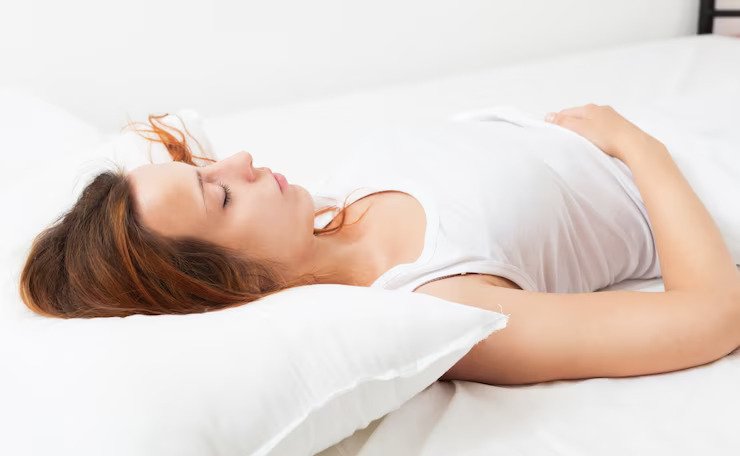How To Sleep After Breast Surgery
Sleep plays a pivotal role in the human body’s recovery and healing process, particularly in the aftermath of surgery.
Among the many types of operations, breast surgery poses a set of challenges when it comes to restful sleep. Whether it’s a lumpectomy, mastectomy, or breast augmentation, the discomfort and changes that follow these procedures can significantly impact sleep patterns.
Breast augmentation, in particular, is increasingly common. It’s one of the most frequently performed surgical cosmetic procedures globally. Statistics from 2021 show that over 1.6 million breast augmentation procedures were performed in that year alone, further emphasizing the relevance of our discussion.
This blog post will delve into the strategies to surmount these challenges, aiming to equip those recovering from breast surgery with the tools necessary to achieve comfortable, restorative sleep.
Understanding The Impact Of Breast Surgery On Sleep

Breast surgery, encompassing procedures like lumpectomy, mastectomy, or the introduction of transformative breast implants, like any other surgical procedure, triggers a response from the body. This reaction can lead to inflammation and discomfort, and significantly alter the way you move or position yourself, particularly affecting your sleep.
The presence of new breast implants in the body can present additional factors to consider when trying to find comfortable resting positions. Pain, a common aftermath of surgical procedures, can disrupt sleep cycles, leading to conditions like insomnia or fragmented sleep.
Pain relief medications, while useful, can induce daytime drowsiness, further complicating sleep patterns at night. Moreover, alongside these physical challenges, the emotional toll, including anxiety and stress often accompanying the journey of surgical recovery, can exacerbate sleep disturbances.
Preparing Your Sleep Environment
The environment in which you sleep plays a critical role in promoting deep, restful sleep. A comfortable bed and pillows are essential, especially after breast surgery, when you might need extra support to avoid discomfort. Keep your room at a cool temperature, preferably between 60 to 67 degrees Fahrenheit, as it can enhance the quality of your sleep.
Light and noise control are also crucial. Use blackout curtains and white noise machines if necessary. The decor of your room also contributes to creating a relaxing atmosphere. Use soothing colors, reduce clutter, and personalize the space to create a sense of tranquility.
Finding The Right Sleep Position
After breast surgery, finding a comfortable sleep position can be a challenge. It is frequently suggested that you should sleep either on your back or semi-reclined to prevent any strain on the operated area.
Utilizing body pillows or foam wedges could be beneficial in offering additional support and keeping a cozy position all night long. Discovering the most effective method might require some experimentation, yet the endeavor is significantly justified by the improvement you’ll see in your sleep quality.
Pain Management
Pain can be a significant barrier to sleep after surgery. It’s essential to follow your doctor’s prescribed pain medication regimen to manage this discomfort effectively. Beyond pharmaceutical interventions, consider employing non-medical pain management strategies like relaxation methods, visually guided techniques, and heat or cold application.
If the pain intensifies and becomes unbearable, it’s critical to notify your healthcare professional. This could indicate potential complications or the necessity to reevaluate and adjust your current pain control plan.
Dealing With Anxiety And Emotional Stress
Surgery might have a negative impact on your mental health. The stress and anxiety that comes with the recovery process can make falling asleep and staying asleep difficult. Practices like meditation, deep breathing, and progressive muscle relaxation are beneficial in handling stress.
Additionally, if the situation becomes too burdensome, don’t forget that it’s perfectly acceptable to consult with a mental health expert. Combatting stress and anxiety becomes a bit easier when you know their symptoms right. The physical signs of emotional stress as well as anxiety, might include:
- A feeling of being sick
- A sudden change in appetite
- Interrupted sleep schedule
- Tensions around the muscle
- Difficulties in concentrating
- Tightness around the chest and breast area
- Diarrhea
- Easily getting irritated than usual
Anxiety, in certain cases, might become so overwhelming that it can result in panic attacks. But many of these symptoms can be put to an end with the right diagnosis. Ask your doctor to help you out not only during the surgery but after that.
The Role Of Nutrition In Post-Surgery Recovery And Sleep

Proper nutrition plays a crucial part in post-surgery recovery and promoting good sleep. Maintaining a diet rich in proteins, vitamins, and minerals can facilitate your body’s recovery process.
Alternatively, sleep can be disturbed by caffeinated beverages, alcohol, and sizable meals, and therefore it is wise to steer clear of them. Ensure you remain well-hydrated and consider the use of specific supplements, with your doctor’s guidance, to bolster your overall health and sleep quality.
Incorporating Gentle Movement And Exercise
Light exercise can be beneficial for sleep and overall recovery after surgery. Mild physical activities, such as walking or performing easy stretches, can assist in decreasing inflammation, enhancing mood, and fostering improved sleep.
Nonetheless, it’s crucial to seek your physician’s consent prior to initiating any post-surgical exercise routine. Your body requires ample time for recovery, and undue strain can prolong this healing period.
Follow-Up Care And Restful Sleep
Breast lift, breast reduction, or breast augmentation- all of them are infamous cosmetic breast surgeries. These can enhance your appearance and your quality of life and also boost the self-confidence of a person. However, breast surgeries might have a negative impact on your mental health and sleep cycle.
Keeping follow-up appointments is crucial for your recovery and your sleep. These visits allow your doctor to monitor your healing process, address any complications early, and adjust your treatment plan as necessary, which will, in turn, positively impact your sleep. Make sure you sleep on your back as long as there is some pain around the area.
Getting sound sleep is critical for a smooth recovery right after you have opted for breast surgery. These tips will surely ensure that you get the adequate amount of sleep needed post-surgery. Give your body the right time to heal as well as recover!
Conclusion
Achieving a peaceful sleep, post-breast surgery hinges on multiple aspects, such as creating a cozy sleeping setting, effective pain control, addressing emotional turmoil, maintaining a well-rounded diet, and engaging in light physical activity.
Each individual’s journey is distinct, and discovering the most effective approach may take a while. Keep in mind it’s completely fine to ask for assistance and proceed at a pace that suits you best. Your journey to recovery is yours alone, and every small step toward better sleep is a step toward healing.
Read Also:








